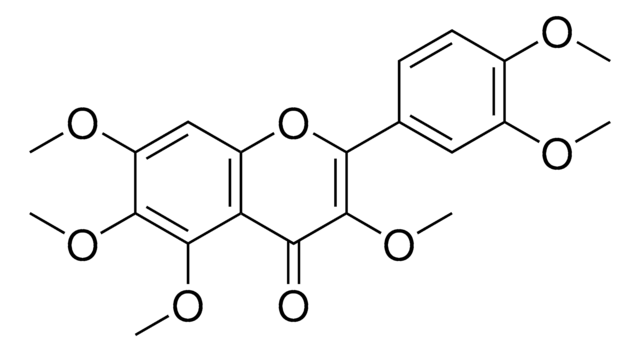T8951
Tangeretin
≥95% (HPLC)
Sinónimos:
4′,5,6,7,8-Pentamethoxyflavone, 5,6,7,8-Tetramethoxy-2-(4-methoxyphenyl)-4H-1-benzopyran-4-one, NSC 53909, NSC 618905, Ponkanetin
About This Item
Productos recomendados
Quality Level
assay
≥95% (HPLC)
application(s)
metabolomics
vitamins, nutraceuticals, and natural products
SMILES string
COc1ccc(cc1)C2=CC(=O)c3c(OC)c(OC)c(OC)c(OC)c3O2
InChI
1S/C20H20O7/c1-22-12-8-6-11(7-9-12)14-10-13(21)15-16(23-2)18(24-3)20(26-5)19(25-4)17(15)27-14/h6-10H,1-5H3
InChI key
ULSUXBXHSYSGDT-UHFFFAOYSA-N
¿Está buscando productos similares? Visita Guía de comparación de productos
General description
Application
Biochem/physiol Actions
signalword
Warning
hcodes
Hazard Classifications
Acute Tox. 4 Oral
Storage Class
11 - Combustible Solids
wgk_germany
WGK 3
ppe
Eyeshields, Faceshields, Gloves, type P2 (EN 143) respirator cartridges
Certificados de análisis (COA)
Busque Certificados de análisis (COA) introduciendo el número de lote del producto. Los números de lote se encuentran en la etiqueta del producto después de las palabras «Lot» o «Batch»
¿Ya tiene este producto?
Encuentre la documentación para los productos que ha comprado recientemente en la Biblioteca de documentos.
Los clientes también vieron
Nuestro equipo de científicos tiene experiencia en todas las áreas de investigación: Ciencias de la vida, Ciencia de los materiales, Síntesis química, Cromatografía, Analítica y muchas otras.
Póngase en contacto con el Servicio técnico












